Opposition to ACCC green light for DP World takeover of Silk Logistics
Australian shippers and forwarders have reacted with disappointment to the country’s competition regulators giving the ...

China Merchants Energy Shipping (CMES) said on Friday it would enter the container segment by fully acquiring its affiliate, Sinotrans Container Lines (Sinolines), for $316m.
CMES, the second-largest Chinese state-controlled shipping group after China Cosco Shipping Corporation, is currently active in the crude oil tanker and ...

Comment on this article